

Subsidy. A subsidy is a form of financial or in kind support extended to an economic sector (or institution, business, or individual) generally with the aim of promoting economic and social policy.[1] Although commonly extended from Government, the term subsidy can relate to any type of support - for example from NGOs or implicit subsidies.
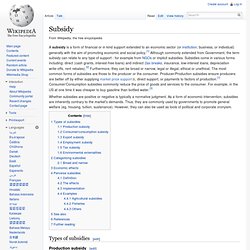
Subsidies come in various forms including: direct (cash grants, interest-free loans) and indirect (tax breaks, insurance, low-interest loans, depreciation write-offs, rent rebates).[2] Furthermore, they can be broad or narrow, legal or illegal, ethical or unethical. The most common forms of subsidies are those to the producer or the consumer. Producer/Production subsidies ensure producers are better off by either supplying market price support, direct support, or payments to factors of production.[1] Consumer/Consumption subsidies commonly reduce the price of goods and services to the consumer.
Types of subsidies[edit] Production subsidy[edit] Definition[edit] Swing state. Swing states in the 2012 presidential election.
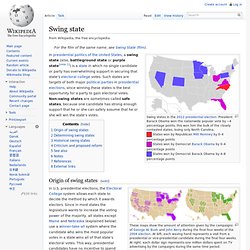
President Barack Obama won the nationwide popular vote by ~4 percentage points; this won him the bulk of the closely contested states, losing only North Carolina. States won by Republican Mitt Romney by 0–4 percentage points States won by Democrat Barack Obama by 0–4 percentage points. Electoral college.
Ballot. A ballot is a device used to cast votes in an election, and may be a piece of paper or a small ball used in secret voting.[1] It was originally a small ball (see blackballing) used to record decisions made by voters.
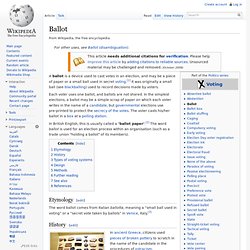
Each voter uses one ballot, and ballots are not shared. In the simplest elections, a ballot may be a simple scrap of paper on which each voter writes in the name of a candidate, but governmental elections use pre-printed to protect the secrecy of the votes. Absentee ballot. An absentee ballot is a vote cast by someone who is unable or unwilling to attend the official polling station.
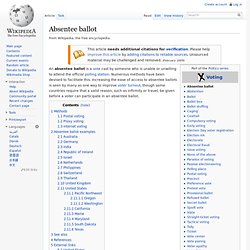
Numerous methods have been devised to facilitate this. Increasing the ease of access to absentee ballots is seen by many as one way to improve voter turnout, though some countries require that a valid reason, such as infirmity or travel, be given before a voter can participate in an absentee ballot. Methods[edit] Postal voting[edit] In a postal vote, the ballot papers are posted out to the voter – usually only on request – who must then fill them out and return them, often with some form of certification by a witness and their signature to prove their identity. US online voting system vulnerable to hacks. What is a PAC? Political Action Committee (PAC) — A popular term for a political committee organized for the purpose of raising and spending money to elect and defeat candidates.

Most PACs represent business, labor or ideological interests. PACs can give $5,000 to a candidate committee per election (primary, general or special). They can also give up to $15,000 annually to any national party committee, and $5,000 annually to any other PAC. PACs may receive up to $5,000 from any one individual, PAC or party committee per calendar year. A PAC must register with the FEC within 10 days of its formation, providing name and address for the PAC, its treasurer and any connected organizations. PACs have been around since 1944, when the Congress of Industrial Organizations (CIO) formed the first one to raise money for the re-election of President Franklin D.
Many politicians also form Leadership PACs as a way of raising money to help fund other candidates' campaigns. Ch 7 Vocabulary: Electoral Process flashcards. Federal Election Commission Home Page. Previous Images Next Images Disclosure Portal: The Federal Election Commission's Campaign Finance Disclosure Portal provides a single point of entry to campaign finance data.

Candidate & Committee Viewer: The Candidate and Committee Viewer includes two-year summaries, report summaries, report images and viewable and downloadable electronic filings all in one place. What's the difference between soft and hard money campaign contributions?" In the simplest terms, "hard money" is from political donations that are regulated by law through the Federal Election Commission.

"Soft money" is money donated to political parties in a way that leaves the contribution unregulated. The difference boils down to a few crucial words and one administrative ruling. In 1978, the Federal Election Commission issued an administrative ruling that the funding rules established by law only applied to political campaigns, and not to "party building" activities. The commission didn't go into great detail about what constituted a party building activity, basically defining it as something that didn't explicitly tell people to vote for a specific candidate. The ruling was issued, and political parties uniformly ignored it until 1988.
Hard money. Soft money. Primary election. A primary election is an election that narrows the field of candidates before an election for office.
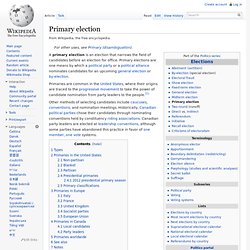
Primary elections are one means by which a political party or a political alliance nominates candidates for an upcoming general election or by-election. Primaries are common in the United States, where their origins are traced to the progressive movement to take the power of candidate nomination from party leaders to the people.[1] Other methods of selecting candidates include caucuses, conventions, and nomination meetings. Historically, Canadian political parties chose their candidates through nominating conventions held by constituency riding associations. Canadian party leaders are elected at leadership conventions, although some parties have abandoned this practice in favor of one member, one vote systems. What is an Open Primary Election? - mobile wiseGEEK. The problem is the "primaries" have become the elections.

In the recent "election", we had to give up our right to vote for local candidates, in the Dem primary, called "the election", or give up the right to vote for state candidates in the Rep primary. My wife got the Rep ballot, and I got the Dem ballot, so we at least got one vote between the two of us. What's fair about that? Had we just declared we were independent, then we would both have been denied the right to vote! What Is a Closed Primary? - mobile wiseGEEK. Closed Primary.